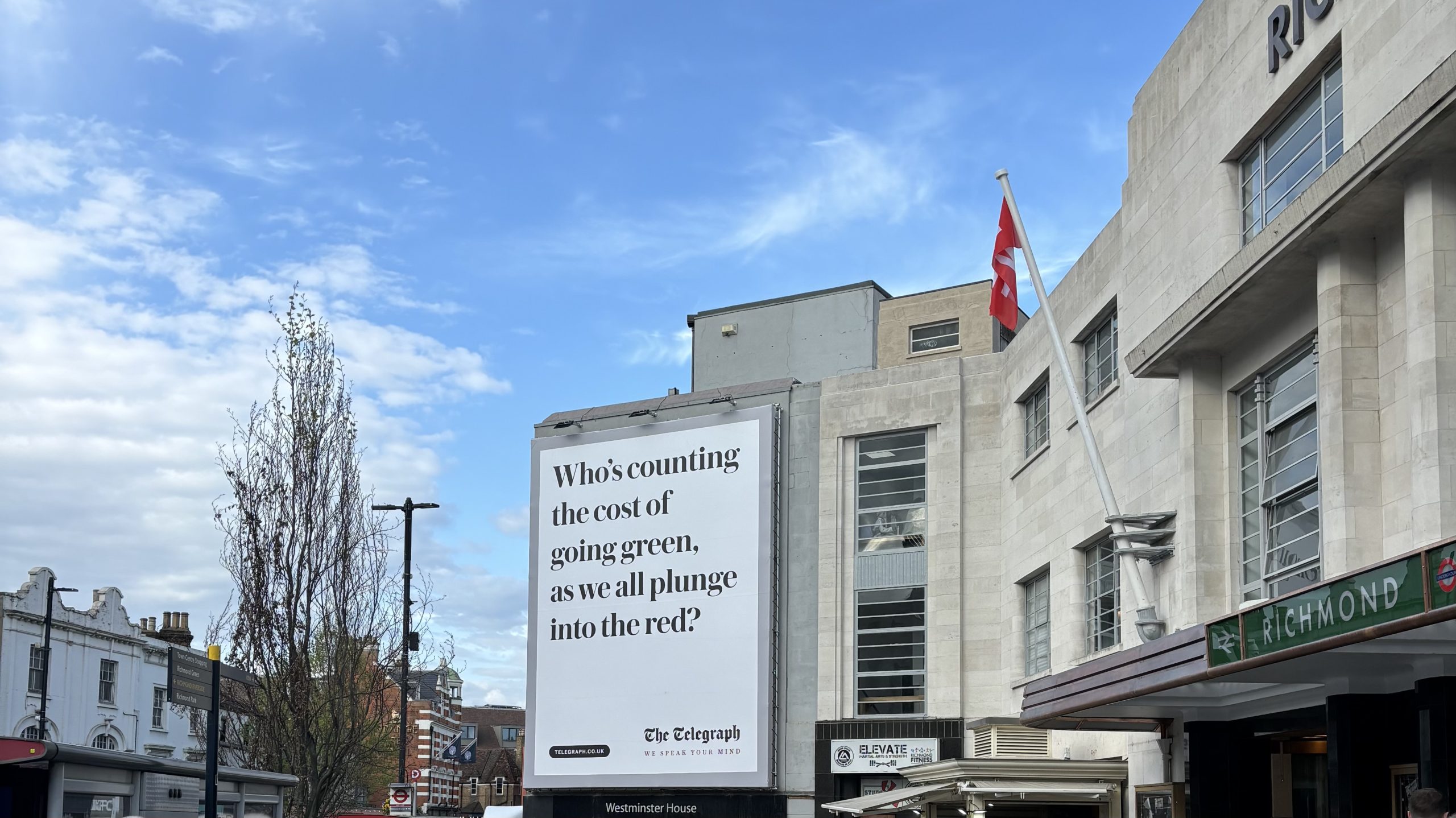The anti-green agenda: The climate crisis hasn’t gone away, so why the apparent corporate rowback?
Article by:Alex Maxwell

The Dead Sea’s water level is decreasing by approximately 1.5 metres every year.
That’s the statistic I came across as I sauntered around the impressive Sony World Photography Awards exhibition at Somerset House recently. The description was attached next to a photo suitably titled The Dying Dead Sea, and I couldn’t – but sadly very much could – believe the scale at which human activities were delivering its death. It’s a stark message.
A few days later I came across an advert by The Telegraph on a huge hoarding board near our workspace that declared: “Who’s counting the cost of going green, as we all plunge into the red?”

The Telegraph’s advert displayed by Richmond station
It was quite the contrast to my previous imagery. The supposed ‘economic damage’ of going green has been used by climate skeptics over the years to thwart net zero progress. And this opinion is one of several currently ramping up a renewed anti-green corporate agenda.
Bucking the anti-green PR trend
Yes, there can be an extra financial cost for being sustainable, especially for the everyday consumer. But that is why a large chunk of responsibility lies with governments and businesses. As these businesses know, to end up in a position of both growth and sustainable operations there sometimes has to be a period of investment into the red (alongside the implementation of new working processes).
There was utter dismay when BP announced in February it would cut renewable energy investments and increase oil and gas production instead. Lining the pockets of investors was apparently good enough reasoning to renege on its climate targets. (It’s worth noting that a quarter of investors have since voted against the re-election of BP’s chairman on the basis of this viewpoint.)
Such announcements have contributed to a media agenda giving the impression that many large companies are slowing down or reversing their sustainability targets. But while big names like BP have attempted to script the media narrative so the storyline caters to their strategy, the subtext between the lines shows that most companies are still sticking to their principles.
As Paul Simpson explains for Management Today, a 2025 PWC report showed 84% of large companies are standing by their climate commitments – it’s just that much of the “good news” doesn’t make the headlines.
This is exactly the good news that needs to be seen.
The tech players tackling the climate crisis
Not only is this a climate emergency without the urgency, but a climate emergency in radical ascendency. While certain corporations flounder with their net zero ambitions and governments differ on policy, tech remains an even bigger and necessary strand of hope.
Regenerative agriculture, for example, is a farming process that restores and enhances soil health. Less realised, however, is the fact that soil can remove massive volumes of carbon dioxide from the atmosphere: healthy soils act as carbon sinks.
Our client Agreena provides verification technologies that measure the effectiveness of regenerative practices and soil carbon sequestration – the process of capturing and storing carbon in soil. Companies can invest in these initiatives via soil carbon credits to offset their emissions in a tangible way.
But as Agreena says, the key now is to diversify the range of credits businesses are investing in. Currently, only a few major players purchase tech-based offsetting credits in large volumes, which is why the good news needs to be spread about more cost-effective verified solutions like soil carbon.
In an example of such good news, yesterday the European Space Agency (ESA) launched “a first-of-a-kind satellite” that will be able to accurately work out how much carbon dioxide the world’s rainforests store “beneath the canopy”. For companies, this evidence could play an active role in lobbying for their decarbonisation efforts.
It would be remiss not to mention one of the troublesome paradoxes in the tech world: AI, seen as both a force of good and evil in the fight to save the planet. The technology could conjure up innovative solutions to our greatest climate problems that we couldn’t even conceive of. But as it develops, we have to find ways to mitigate the vast consumption of energy, water and resources by the data centres it relies on.
That responsibility, again, largely lies with governments and big tech. However, we’ve worked with companies taking on the mantle to improve data centres’ sustainability with concepts like 3D optics and code optimisation, which can notably reduce AI’s carbon footprint.
Renewable energy of course lies at the epicentre of this problem and any sustainability strategy. It’s now on a par cost wise with coal and gas and this will only improve. So, not only is there a moral incentive for companies to actively shift to renewable sources, but a financial one businesses crave too.
Squashing ‘greenhushing’ with sustainable PR
Tech startups and scaleups are shaping the sustainability agenda, sending ripples of progress and innovation to the highest reaches of business and society. Their work can influence decision makers and large organisations to adopt change, as well providing sustainable methods for any company to incorporate. It’s why their story is so valuable and one that deserves to be heard amidst the prevailing anti-green corporate agenda.
Sometimes when the tides appear to be flowing heavily back to old territory, the best way to stand out is to stick your oar into the sand and stand by your principles. Those rowing back on climate goals now will only suffer the consequences in the long run. Those rowing ahead will actively form our future.
There’s also the simple truth that sustainability isn’t just a choice – it’s integral to the planet as we know it. Therefore, telling your story about how you’re confronting the greatest challenge of our lifetimes isn’t just good for business – it’s integral to all our livelihoods.
Related Articles

Human brain power doesn’t cost the environment, ChatGPT’s does – so should we be moderating our AI use?
Article by:Alex Maxwell